We may not have the course you’re looking for. If you enquire or give us a call on +44 1344 203 999 and speak to our training experts, we may still be able to help with your training requirements.
Training Outcomes Within Your Budget!
We ensure quality, budget-alignment, and timely delivery by our expert instructors.
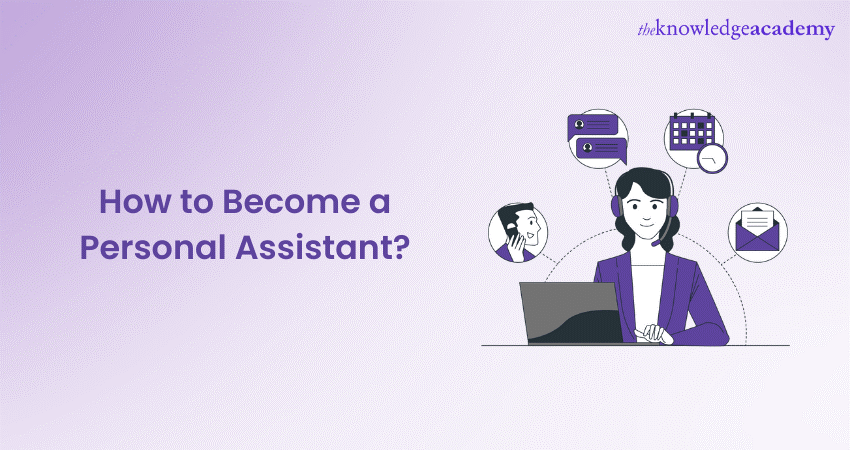
Embarking on a career journey requires a roadmap, especially when aspiring to become a Personal Assistant. Navigating the intricate steps and strategies encapsulated in the process of How to Become a Personal Assistant has proven to be of immense benefit.
From understanding the nuances of the role to cultivating the essential skills and strategically entering the job market, this comprehensive blog is designed to equip individuals with the insights needed to carve out a successful path in the dynamic realm of personal assistance.
Table of Contents
1) Steps to become a personal assistant
a) Achieve a high school diploma
b) Seek a bachelor's degree
c) Polish and refine your skills
d) Acquire valuable experience
e) Explore online courses or earn certifications
f) Submit job applications.
2) Tips to get a job as a Personal Assistant
3) What are the responsibilities of personal assistants?
4) Conclusion
Steps to become a personal assistant
Following a structured set of steps to become a Personal Assistant is crucial for success in this dynamic role. It ensures a comprehensive understanding of responsibilities, the development of essential skills, and strategic navigation of the job market.
This systematic approach maximises opportunities, setting the foundation for a fulfilling and prosperous career. Below are the key steps explained in detail:
1) Achieve a high school diploma
Attaining a high school diploma is a foundational step in the journey to becoming a successful Personal Assistant. This educational milestone provides a solid academic background, honing essential skills like communication and critical thinking.
Moreover, a diploma not only enhances one's employability but also demonstrates commitment and discipline. It serves as the initial qualification that opens doors to further educational pursuits or directly enters the workforce.
Further, this achievement signifies readiness for the professional world and establishes a platform for personal and career growth, laying a robust foundation for the subsequent steps in the pursuit of a career as a Personal Assistant.
2) Seek a bachelor's degree
Pursuing a bachelor's degree is a pivotal step in the journey toward becoming a proficient Personal Assistant. This higher education milestone offers in-depth knowledge, refines critical thinking, and cultivates advanced skills crucial for success in the dynamic field.
Additionally, the structured curriculum provides insights into business administration, organisational behaviour, and project management, enhancing the candidate's professional acumen. A bachelor's degree not only amplifies one's qualifications but also signifies dedication to continuous learning.
Moreover, this academic achievement elevates a candidate's competitiveness in the job market, opening doors to diverse opportunities and laying the groundwork for a successful career as a Personal Assistant.
Eager to crack your interview for a personal assistanyt role, refer to our blog on "Personal Assistant Interview Questions"
3) Polish and refine your skills
Polishing and refining skills is a paramount step in the journey to becoming an adept Personal Assistant. This ongoing process involves honing organisational prowess, communication finesse, and technological proficiency.
Further, attention to detail, time management, and adaptability are fine-tuned, ensuring seamless task execution. Continuous improvement in interpersonal skills and problem-solving enhances versatility in navigating challenges.
Moreover, professional development through workshops, courses, and mentorship sharpens the edge, making the aspiring Personal Assistant an invaluable asset. This step is a commitment to excellence, empowering individuals to meet the dynamic demands of the role and stand out in a competitive market, fostering continual growth and success.
4) Acquire valuable experience
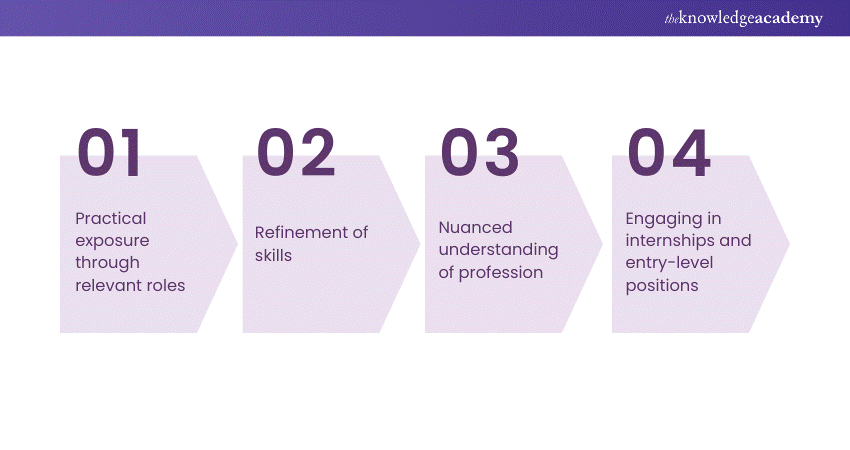
Acquiring valuable experience is a pivotal step on the path to becoming an accomplished Personal Assistant. Practical exposure in administrative roles, event coordination, and project management refines one's skills and cultivates a nuanced understanding of the profession.
More importantly, engaging in internships, volunteer opportunities, or entry-level positions provides hands-on experience in diverse scenarios. This exposure not only hones organisational and interpersonal skills but also builds a robust professional network.
Valuable experience serves as a testament to competency, setting candidates apart in the competitive job market. It lays the groundwork for a successful career as a Personal Assistant, equipped with practical insights and a proven track record.
5) Explore online courses or earn certifications
Exploring online courses and earning certifications constitutes a strategic step in the journey toward becoming an adept Personal Assistant. Staying updated with industry trends and acquiring specialised knowledge is essential. Candidates can do so with online courses that educate them and instil the skills to manage schedules effectively, coordinate meetings and handle corporate communications.
Such courses help them handle difficult project tasks, streamline their communication channels and improve their productivity. Moreover, other courses in Project Management, Communication, and Software proficiency offer a flexible and accessible means to enhance skills. Certifications, such as those in office administration or organisational leadership, not only validate expertise but also demonstrate commitment to professional development.
More importantly, such credentials help amplify the appeal of a candidate in the competitive job market, showcasing a proactive approach to staying abreast of evolving demands. By investing time in targeted online learning, aspiring Personal Assistants can augment their skill set, ensuring they are well-equipped to navigate the complexities of their role with competence and confidence.
6) Submit job applications
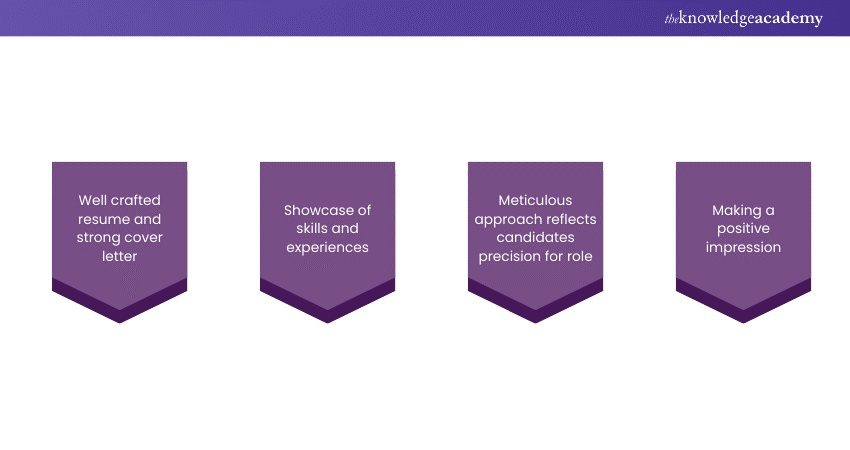
Submitting job applications is a pivotal step on the path to becoming a Personal Assistant. Armed with a polished resume and compelling cover letter, candidates strategically showcase their skills and experiences.
Tailoring each application to match the specific requirements of prospective employers demonstrates a nuanced understanding of the role. Navigating online job platforms, company websites, and professional networks expands the reach of applications, maximising opportunities.
A meticulous approach to the application process, including adherence to deadlines and attention to detail, reflects the precision expected in a Personal Assistant role. Each submission is a chance to make a positive impression and secure an interview, making the application phase a critical aspect of the overall journey.
More importantly, persistence, professionalism, and a strategic approach to job applications are key elements in securing a position as a capable and sought-after Personal Assistant.
Improve your efficiency and productivity with data by signing up for our Data Entry Masterclass now!
Tips to get a job as a Personal Assistant
Below are more key tips to land a job as a Personal Assistant:
1) Gain deeper knowledge about the PA and Secretarial industry
You can gain more knowledge of the PA and Secretarial industry by taking the guidance of the following pointers:
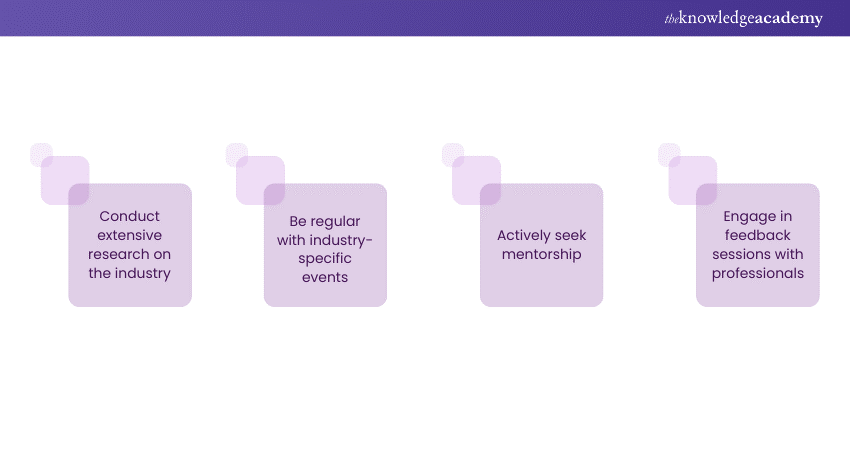
a) Industry research: Begin by conducting thorough research on the Personal Assistant (PA) and Secretarial industry to understand its current market, trends, and challenges.
b) Industry publications: Subscribe to industry publications, magazines, or online platforms to stay updated on the latest news, best practices, and emerging technologies within the field.
c) Networking: Attend industry-specific events, conferences, or seminars to network with professionals in the PA and Secretarial domain. Engaging in conversations can provide insights into the industry's nuances.
d) Professional associations: Join relevant professional associations or online forums where industry experts and practitioners share their experiences and knowledge. This allows for valuable connections and access to industry-specific resources.
e) Online courses: Sign up for online courses or webinars focused on PA and Secretarial skills. Platforms like LinkedIn Learning or industry-specific organisations often offer courses that delve into the intricacies of the profession.
f) Mentorship: Seek mentorship from experienced professionals in the PA and Secretarial industry. Learning from their experiences can provide practical insights and guidance for navigating the unique challenges of the role.
g) Company research: Investigate the specific needs and expectations of companies within the industry. Understanding the varied demands of different sectors will help tailor your skills to meet specific employer requirements.
h) Stay informed on technology: Given the evolving nature of technology, stay informed about the latest tools and software relevant to the PA and Secretarial roles. Proficiency in digital tools enhances efficiency and productivity.
i) Industry reports: Consult industry reports and market analyses to gain a macro-level understanding of the PA and Secretarial profession, including growth areas and potential areas for specialisation.
j) Feedback: Seek feedback from professionals currently working in the industry. Understanding their career trajectories and the challenges they've overcome can provide valuable insights into the practical aspects of the profession.
k) Read industry reports: Explore industry reports and whitepapers to gain a deeper understanding of market dynamics, key players, and future projections.
l) Understand regulatory framework: Familiarise yourself with the regulatory environment governing the industry. Understanding compliance and legal aspects is crucial for success.
m) Follow thought leaders: Identify and follow thought leaders in the industry on social media, blogs, and podcasts. Learn from their experiences and thought processes.
n) Intern or volunteer: Gain hands-on experience through internships or volunteer opportunities within the industry. Practical exposure provides unique insights and enhances your credibility when pursuing a role as a Personal Assistant within that specific field.
2) Conduct market analysis
Conducting market analysis is a strategic practice essential for informed decision-making in business. It involves assessing market dynamics, identifying trends, and evaluating competitors to glean insights into consumer behaviour and preferences.
Through quantitative and qualitative research, businesses can discern opportunities, mitigate risks, and refine their strategies. Market analysis empowers organisations to align products or services with customer needs, anticipate industry shifts, and maintain a competitive edge.
This systematic approach aids in optimising marketing efforts, resource allocation, and overall business positioning, fostering adaptability in the ever-evolving marketplace.
Boost your confidence and employability by signing up for our Office Skills Masterclass now!
What are the responsibilities of Personal Assistants?
The key responsibilities of Personal Assistants are explained in the following manner:
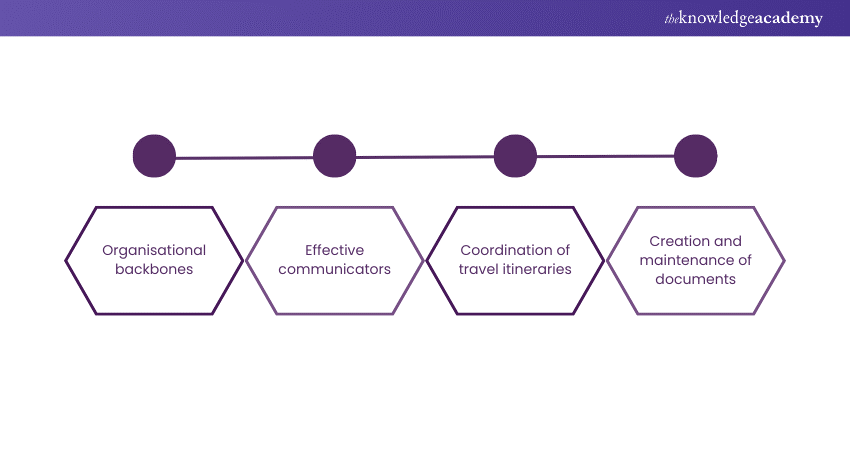
Administrative support
Personal Assistants (PAs) are the organisational backbone, providing crucial administrative support. This includes managing schedules, coordinating appointments, and organising meetings. PAs often act as the primary point of contact between their executives and external parties, ensuring seamless communication.
Communication management
PAs excel in effective communication, handling emails, phone calls, and correspondence on behalf of their executives. They filter and prioritise information, drafting responses with precision. Clear and professional communication is essential in maintaining the image and reputation of the executive.
Travel arrangements
Coordinating complex travel itineraries is a significant responsibility. PAs arrange flights, accommodations, and transportation, considering the executive's preferences and optimising for efficiency. This demands meticulous planning and adaptability to last-minute changes.
Document preparation and management
PAs are adept at creating and editing documents, presentations, and reports. They ensure accuracy and consistency in content, often dealing with sensitive and confidential information. Document management includes organising files, maintaining records, and implementing efficient filing systems.
Project coordination
Personal Assistants are instrumental in project coordination, liaising with different departments, teams, and external partners. They may take on a project management role, overseeing timelines and deliverables and ensuring the project aligns with the executive's objectives.
Event planning
PAs are often responsible for organising events, from small meetings to large conferences. This involves venue selection, catering, logistics, and coordination with vendors. Attention to detail is crucial to ensure events run smoothly and reflect positively on the executive and the organisation.
Information management
PAs manage information flow efficiently, keeping executives informed about relevant updates, deadlines, and priorities. They gather and synthesise data to provide executives with well-informed perspectives for decision-making.
Problem solving and decision support
PAs play a pivotal role in problem-solving, anticipating challenges, and proposing solutions. They act as a sounding board for executives, offering valuable insights and facilitating the decision-making process.
Run operations in a smoother fashion by signing up for our Perfect Executive Personal Assistant Training now!
Conclusion
In conclusion, mastering the multifaceted role of a Personal Assistant demands a strategic blend of skills, education, and experience. This blog outlined the key steps from educational pursuits to skill refinement and job application strategies. Follow these insights on How to Become a Personal Assistant and easily navigate the path to success.
Frequently Asked Questions

Prospective Personal Assistants often wonder about the educational requirements. While a specific degree may not be mandatory, courses in business administration or related fields, along with certifications in relevant skills, can enhance qualifications.

Aspiring Personal Assistants often inquire about the significance of networking. Establishing connections in the industry through events, professional associations, and online platforms is crucial for accessing opportunities and staying informed about industry trends and job openings.

The Knowledge Academy takes global learning to new heights, offering over 30,000 online courses across 490+ locations in 220 countries. This expansive reach ensures accessibility and convenience for learners worldwide.
Alongside our diverse Online Course Catalogue, encompassing 17 major categories, we go the extra mile by providing a plethora of free educational Online Resources like News updates, Blogs, videos, webinars, and interview questions. Tailoring learning experiences further, professionals can maximise value with customisable Course Bundles of TKA.

The Knowledge Academy’s Knowledge Pass, a prepaid voucher, adds another layer of flexibility, allowing course bookings over a 12-month period. Join us on a journey where education knows no bounds.

The Knowledge Academy offers various PA and Secretarial Courses, including Minute Taking Training, Shorthand Training, Reception Skills and Administrative Assistant Masterclass. These courses cater to different skill levels, providing comprehensive insights into PA and Secretarial skills methodologies.
Our PA and Secretarial Course blogs cover a range of topics related to PA and Secretarial Courses, offering valuable resources, best practices, and industry insights. Whether you are a beginner or looking to advance your PA and Secretarial skills, The Knowledge Academy's diverse courses and informative blogs have you covered.
Upcoming Business Skills Resources Batches & Dates
Date
 Company Secretary Training Course
Company Secretary Training Course
Fri 10th Jan 2025
Fri 14th Feb 2025
Fri 11th Apr 2025
Fri 23rd May 2025
Fri 8th Aug 2025
Fri 26th Sep 2025
Fri 21st Nov 2025







 Top Rated Course
Top Rated Course



 If you wish to make any changes to your course, please
If you wish to make any changes to your course, please


